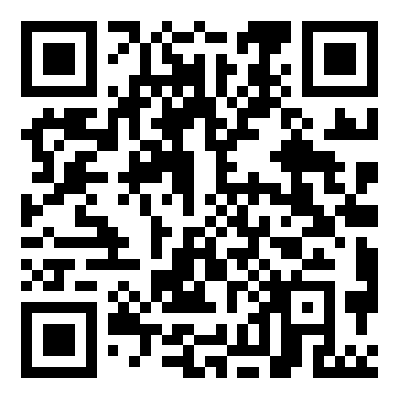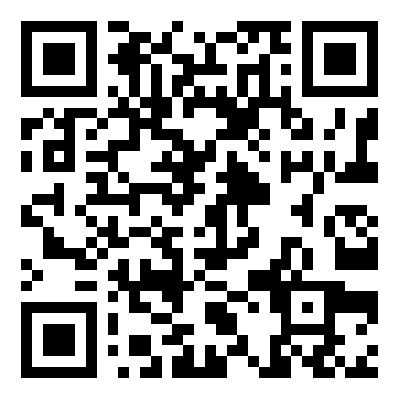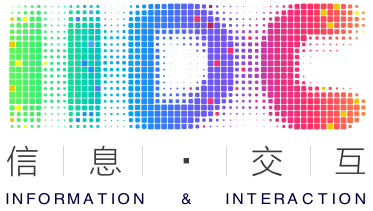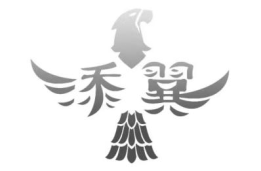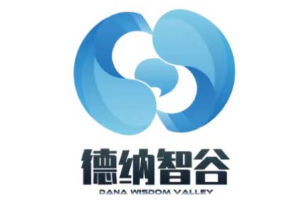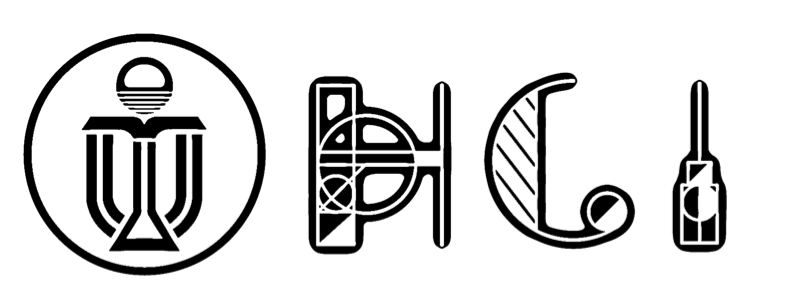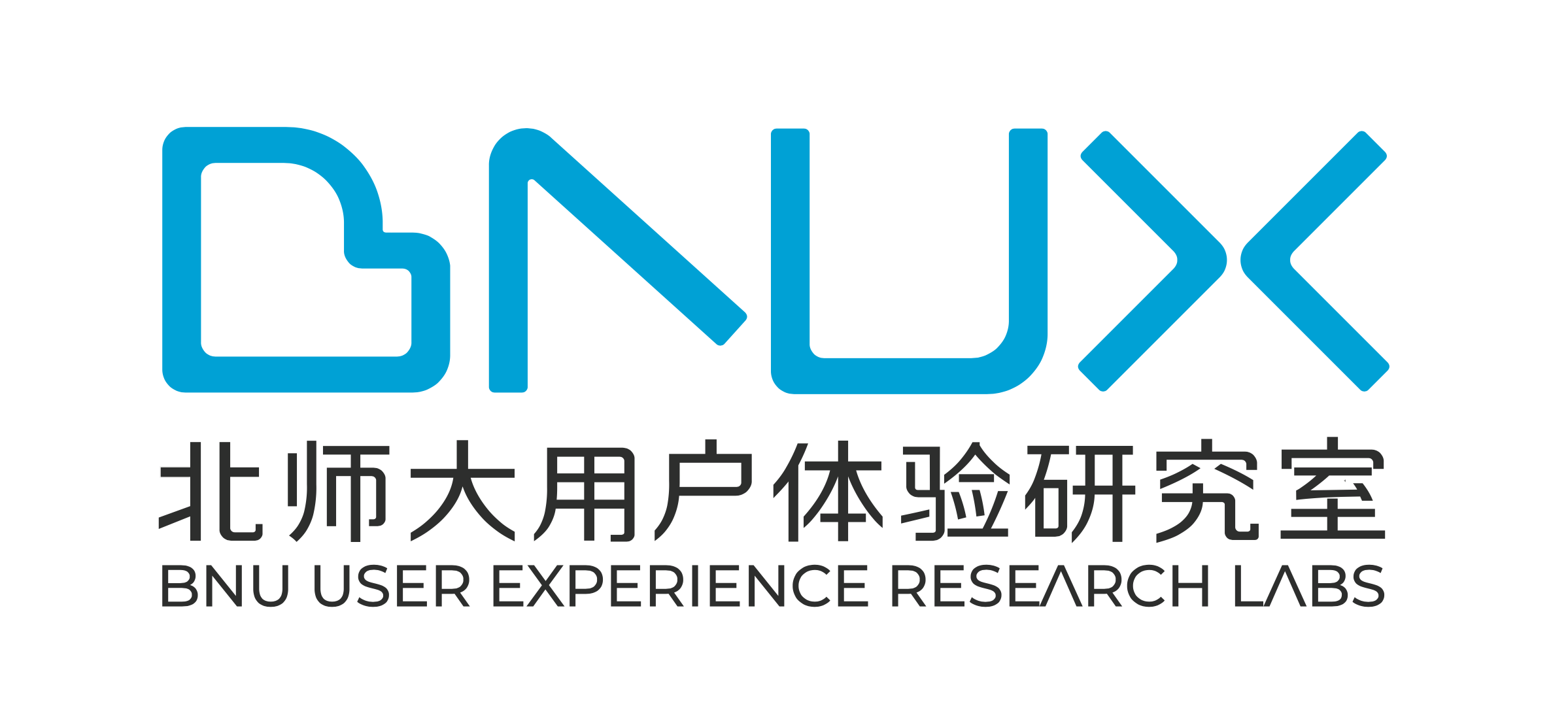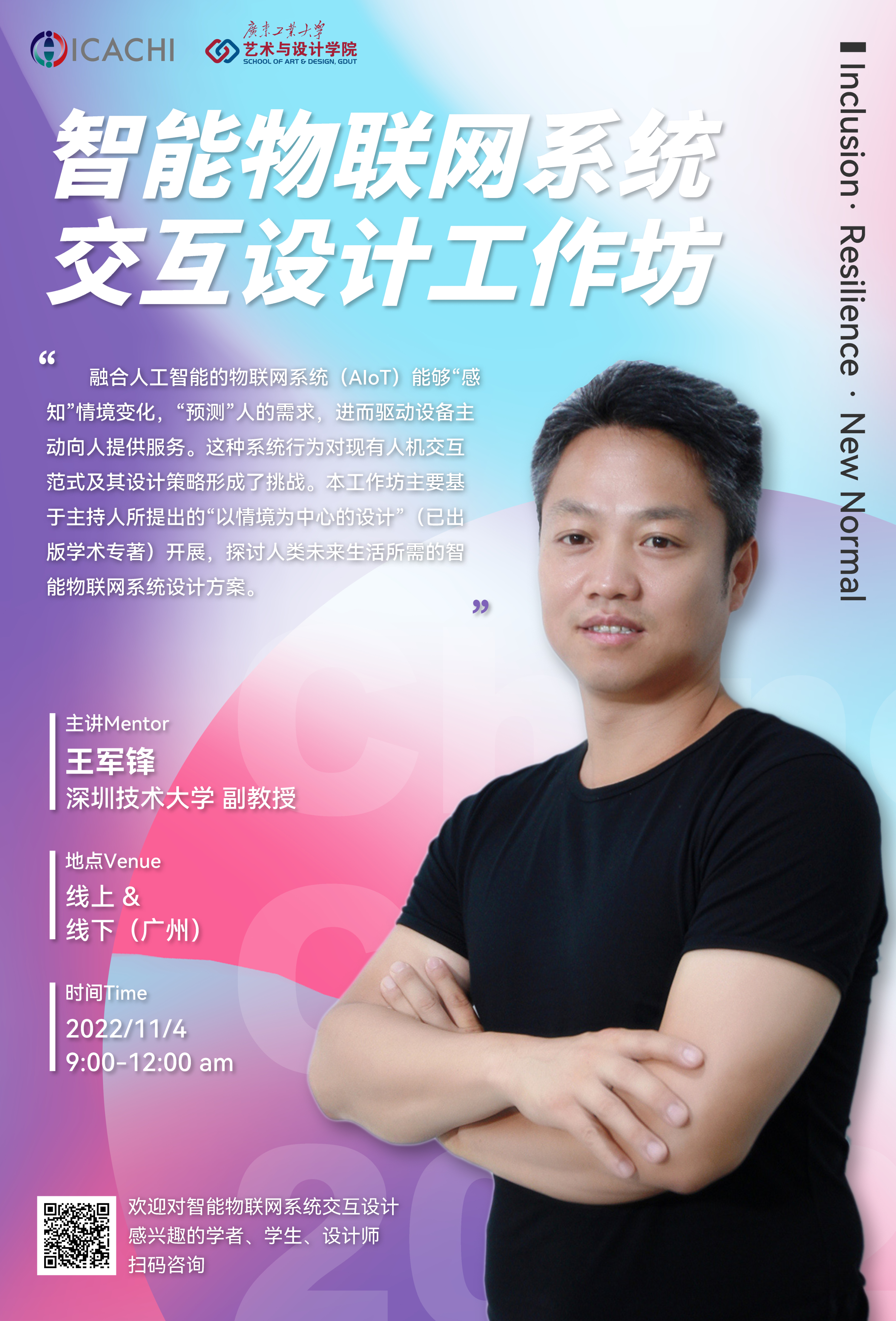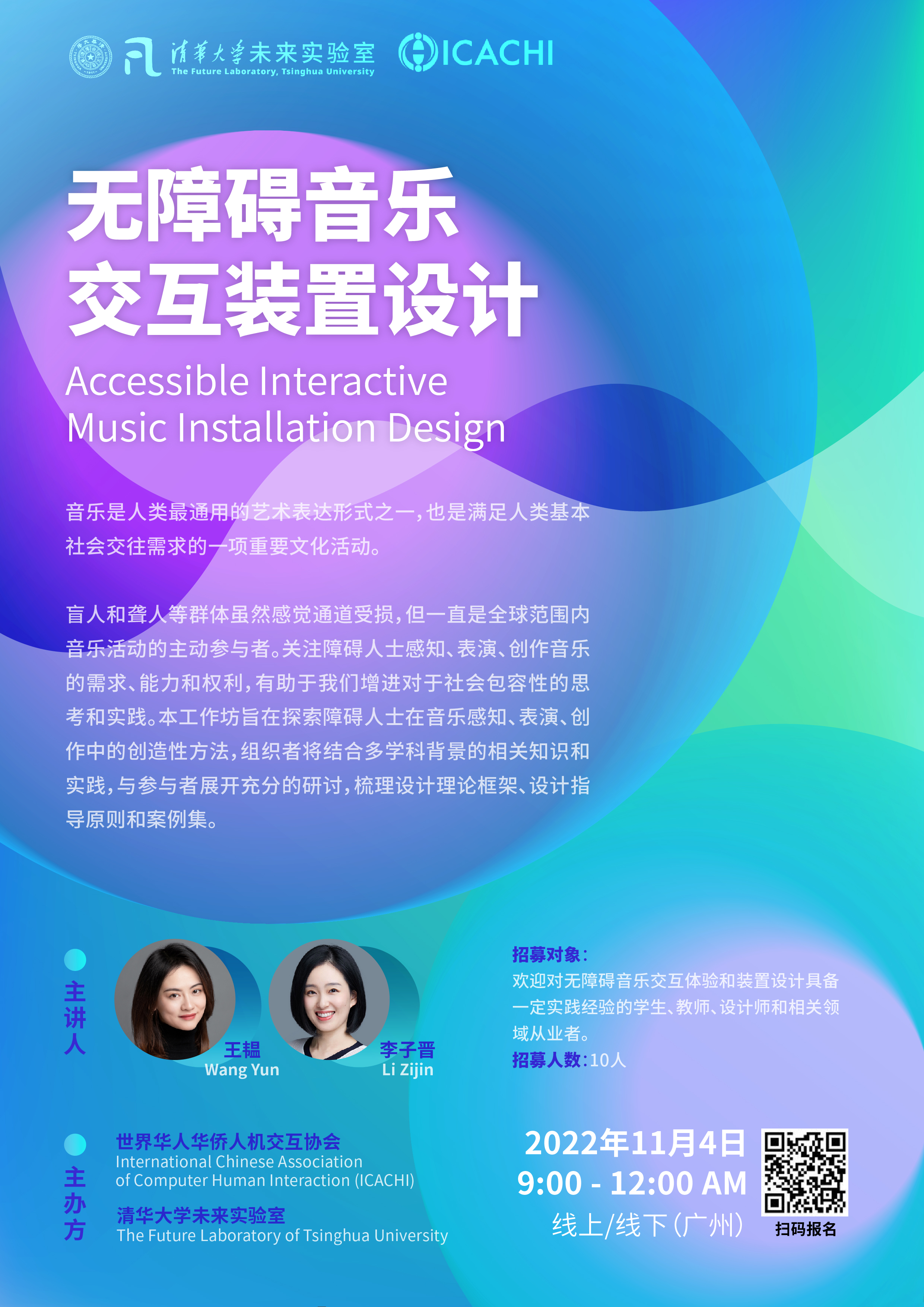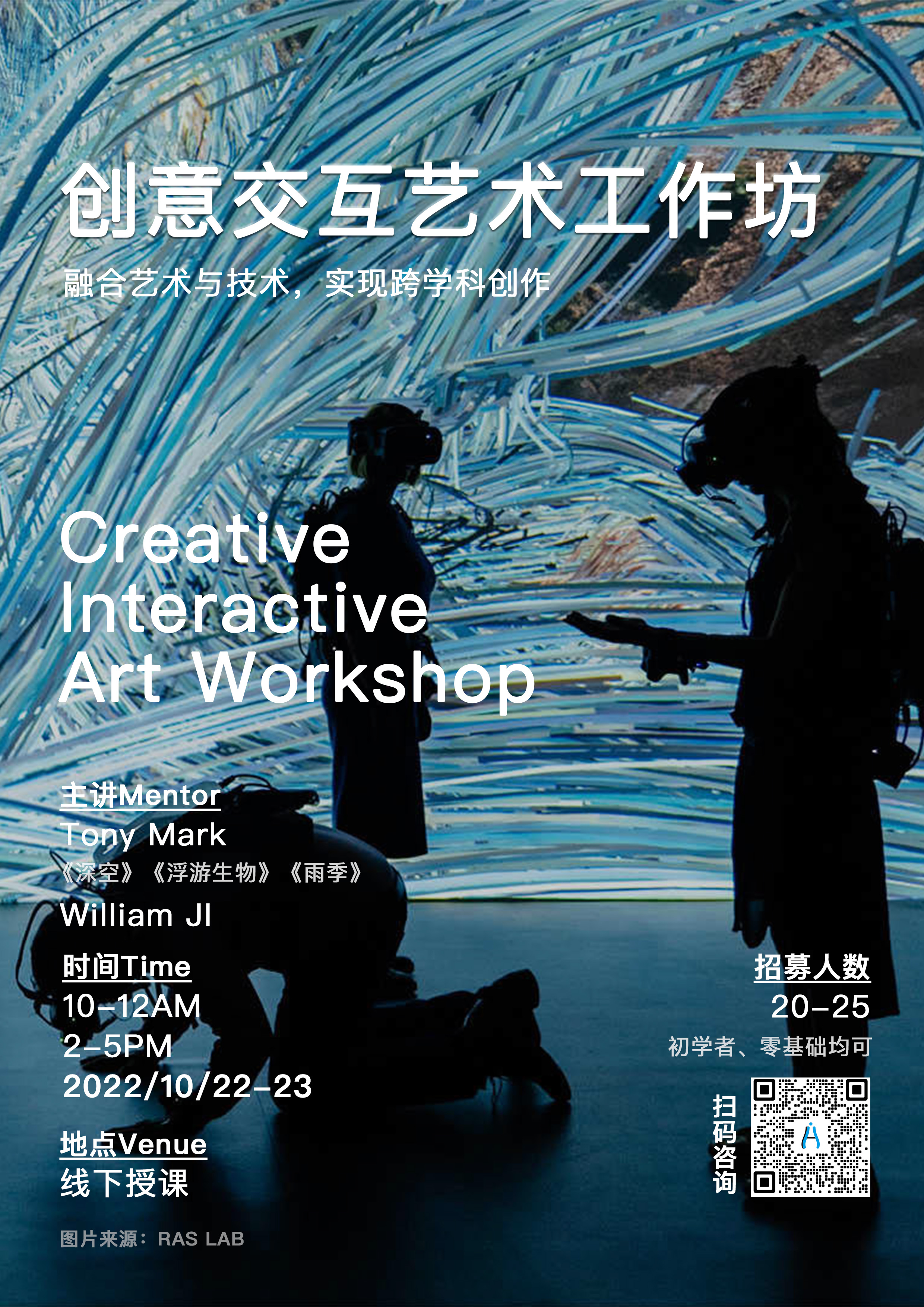Chinese CHI 2022
jointly with the International Workshop on Human-Engaged Computing (IWHEC)
Inclusion · Resilience · New Normal
包容 · 韧性 · 新常态
November 5~6, 2022, Guangzhou (Online)
2022年11月5~6日, 广州 (线上)
Bilibili直播
直播环节:开幕式(北京时间 11月5日 9:00-12:00),圆桌论坛:人机交互跨学科融合与产学研协同发展模式探讨(11月5日 15:00 - 17:30),“智慧出行”主题论坛暨创新大赛发布会(11月6日 09:30 - 11:40),主题论坛:未来智慧交互发展(11月6日 14:00 - 16:30),闭幕式(11月6日 17:00-18:30),详情请见会议议程

The Tenth International Symposium of Chinese CHI (Chinese CHI 2022, jointly with the International Workshop on Human-Engaged Computing) will be structured as a Hybrid-Onsite conference from November 5–6 in Guangzhou, China. Supported by the International Chinese Association of Computer Human Interaction (ICACHI), Chinese CHI is steered by a group of globally distributed HCI researchers, practitioners, academics, and students concerning about the development of HCI as a thriving field in the global Chinese communities. Chinese CHI serves as a primary forum for connecting the international HCI community to the booming Chinese computing industry.
The theme of Chinese CHI 2022 is Inclusion, Resilience, and New Normal. We welcome discussions on the value, significance, and social contribution of human-computer interaction in the context of the post-pandemic era. We plan to have all accepted papers included in the conference proceedings and published through the ACM Digital Library and EI Compendex.
本届 Chinese CHI 2022会议以后疫情时代下的包容,韧性,新常态为主题。会议将于2022年11月5至6日在中国广州召开,采取线上线下同步方式进行。由世界华人华侨人机交互协会(ICACHI)举办的这一学术会议已日益成为连接世界范围内的华人HCI学者、学术界和产业界的重要会议。从2012年起,Chinese CHI已分别在巴黎、多伦多、首尔、硅谷、中国广州、加拿大蒙特利尔、中国厦门及线上成功举办九届。历届会议发表论文均会收录于ACM Digital Library,并提交EI检索。
HOST / 主办
ORGANIZER / 承办
3D Technical Support / 3D虚拟场景技术支持
Sponsor / 赞助
Supporters / 支持
CHINESE CHI 2022 会议日程(北京时间)
Program of Chinese CHI 2022 (Beijing Time)
| 日程 Schedule |
|---|
11月5日(星期六)开幕式(09:00 - 12:20,直播)主持人:张黎 - 广东工业大学艺术与设计学院教授、副院长 嘉宾致辞(09:00 - 09:20)
主旨演讲(09:20 - 12:00)
10:50 - 11:00 间歇 |
| 午休 |
长论文报告(一)(14:00 - 17:20)主持人:李静雅 - 北京交通大学建筑与艺术学院数字媒体艺术系 讲师
14:00 - 15:0015:00 - 15:10 间歇15:10 - 16:1016:10 - 16:20 间歇16:20 - 17:20 |
长论文报告(二)(14:00 - 17:20)主持人:薛梦茹 - 浙江大学(宁波校区)国际合作设计分院 助理教授
14:00 - 15:0015:00 - 15:10 间歇15:10 - 16:1016:10 - 16:20 间歇16:20 - 17:20 |
短论文报告(14:00 - 17:10)主持人:彭振辉 - 中山大学人工智能学院 助理教授
14:00 - 15:0015:00 - 15:10 间歇15:10 - 16:1016:10 - 16:20 间歇16:20 - 17:10 |
圆桌论坛:人机交互跨学科融合与产学研协同发展模式探讨(15:00 - 17:30, 直播)主持人:佘莹莹 - 厦门大学电影学院 副教授,数字媒体技术系副主任
|
11月6日(星期日)主题论坛:人机共协计算 (International Workshop on Human-Engaged Computing, IWHEC)
|
“智慧出行”主题论坛暨创新大赛发布会(09:30 - 11:50, 直播)主持人:钟韬 - 广东工业大学艺术与设计学院 助理教授、工业设计系系主任
|
主题论坛:未来智慧交互发展(14:00 - 16:30, 直播)主持人:纪毅 - 广东工业大学艺术与设计学院 副教授
15:10 - 15:20 间歇 |
闭幕式(17:00 - 18:30, 直播)主持人:陈晨 - 广东工业大学艺术与设计学院 副教授 嘉宾致辞(17:00 - 17:10)
主旨演讲(17:10 - 18:10)
颁奖典礼(18:10 - 18:30)
|
2022华为智慧出行创新大赛
智慧出行创新大赛挑战难题——“围绕车内外智能设备的软件硬件融合,为用户提供安全舒适高效的驾驶、影音娱乐、移动办公体验”。
智慧出行创新大赛挑战设有三个主题赛道:智慧驾驶、第三生活空间、全场景互联。赛道内容如下:
- 智慧驾驶:连接手机、汽车和更多智能设备,为驾驶员提供更加安全、便捷且高效的驾驶体验;
- 第三生活空间:如何在车内,结合更多智能设备,为乘客提供实现舒适,沉浸式的影音娱乐或高效舒适的移动办公体验;
- 全场景互联:连接车内和车外的各种智能设备,以用户为中心,围绕出行场景,提供更加丰富的智能化体验。
时间安排
- 初赛作品报名提交:截至时间2022年12月31日
- 入围名单公布:2023年01月15日
- 软硬件资源发放:2023年01月21日
- 最终作品提交:截至时间2023年03月25日
- 最终评审及颁奖:2023年04月15日 — 2023年04月30日
奖项设置
入围30团队:提供软硬件资源。
最终评审
- 一等奖1名:奖金5万人民币
- 二等奖2名:奖金各2万人民币
- 三等奖3名:奖金各1万人民币
联系方式
艺术与设计学院 徐老师,邮箱:[email protected]。
交互设计工作坊日程(11月4日,广东工业大学东风路校区/线上)
请通过扫描下方海报二维码进行报名,通过下方注册按钮向特定Workshop付费。
集中于人机交互、工业设计、用户体验和用户界面设计领域的任何相关领域,尤其是与今年会议主题有关的具有挑战性的新兴领域,涉及基础研究、应用研究、HCI实践、HCI教育、新方法、新兴应用领域或设计创新。
| 主题 | 收费 | 人数 | 时间 | 地点 | 形式 | 简介 |
|---|---|---|---|---|---|---|
| 智能物联网系统交互设计
组织者:王军锋 - 深圳科技大学 主持人:万千 - 广东工业大学艺术与设计学院 助理教授 |
线下1000元/人
& 线上600元/人 |
20 | 9:00 - 12:00 | 图书馆5楼思政教室 | 线上
& 线下 |
通过学术报告讲解“面向智能物联网系统的交互设计理论和方法”,包括:人工系统及其设计活动的演进引出的AIoT交互设计问题,AIoT的人-系统交互模型,以情境为中心的设计理论和方法。讲解基于情景服务匹配关系的设计概念激发和评估方法,AIoT交互设计的叙事、图表和形式化表达模型等设计工具。以分组形式利用设计工具呈现设计概念并评估及选优。 |
| 无障碍音乐交互装置设计
组织者:王韫 等 - 清华大学未来实验室 世界华人华侨人机交互协会 主持人:潘莉 - 广东工业大学艺术与设计学院 助理教授 |
免费 | 10 | 14:00 - 17:00 | 5-609 | 线上
& 线下 |
通过案例分享来讨论障碍人士在音乐感知、表演、创作中的创造性方法。关注障碍人士感知、表演、创作音乐的需求、能力和权利,有助于设计师增进对于社会包容性的思考和实践。 |
| 面向特殊教育儿童的人工智能交互设计
组织者:范敏 等 - 中国传媒大学动画与数字艺术学院 等 主持人:夏天生 - 广东工业大学艺术与设计学院 副教授 |
免费 | 15 | 9:00 - 12:00 | 图书馆203-1会议室 | 线上
& 线下 |
介绍涉及人工智能能力、设计方法和工具的跨学科知识,以及有特殊需求的儿童的个人和学习特点并提出初步设计框架。与会者将分组工作,参加三项设计和研究活动,包括:(1)讨论和进一步发展设计框架;(2) 将设计框架应用于具体设计案例,并制作低保真度(例如纸张)原型;反映设计实践,细化设计框架。以期通过研讨会发现更多潜在的机会。 |
| AIGC时代下的人机共创 - 从理论到实践,全面掌握AI跨模态绘画大模型
组织者:刘聪琳 - 百度高级产品运营师 主持人:张勇 - 广东工业大学艺术与设计学院 助理教授 |
免费 | 25 | 10:00 - 12:00 & 14:00 - 17:00 |
7-808 | 线下 | 在本次“AIGC时代下的人机共创”工作坊,百度资深研发工程师们将为大家带来AIGC时代的技术全景介绍、工具案例演示和AI Studio平台代码实操,兼具理论与实践,从算法研发与工程实现视角,由浅入深、由宽入专地向大家娓娓道来AIGC的全景图,为设计领域学者和从业者、交叉学科研究者和爱好者,提供有益参考。 |
| 创意交互艺术
组织者:TonyMark、William Ji - 千核文化 主持人:田明辉 - 广东工业大学艺术与设计学院 助理教授 |
线下800元/人
& 线上600元/人 |
25 | 10:00 - 12:00 & 14:00 - 17:00 |
5-401 | 线下 | 教会参与者如何使用相关的软件达到创作的目的,如何去思考背后创作的基本逻辑。通过理论结合实践的方式,让参与者自己选题,并且最后进行公开展演。 |
Registration
| Type 注册类型 | Normal 正常注册 (10月16日 ~ 11月4日) |
Onsite 现场注册 (11月5日 ~ 11月6日) |
Single 单日注册 (参加其中一天) |
|---|---|---|---|
| 线下参会 | 2000 CNY | 2500 CNY | 1200 CNY |
| 线上参会 | 700 CNY | ||
| 智能物联网系统交互工作坊 | 线下1000 CNY,线上600 CNY (11月4日举行,单独收费,限额20人) | - | - |
| 创意交互艺术工作坊 | 线下800 CNY,线上600 CNY (11月4日举行,单独收费,限额25人) | - | - |
Call for Papers
SubmitWe invite you to submit papers to Chinese CHI 2022. Like past years, papers in all areas of human-computer interaction are welcome for submission, including but not limited to:
- User Experience and Usability
- Specific Application Areas
- Health, Accessibility and Aging
- Privacy, Security and Visualization
- Interaction Beyond the Individual
- Games and Play
- Design
- Interaction Techniques, Devices and Modalities
- Understanding People: Theory, Concepts, Methods
- Engineering Interactive Systems and Technologies
- Emergency Management
On top of that, we particularly welcome HCI submissions related to the Chinese cultural context. Examples include but are not limited to:
- Technology use or development in the Chinese context
- Understanding Chinese users
- Interaction techniques tailored to Chinese users
- Community engagement in China
Papers must present original materials and will be assessed on their contributions to the field by expert reviewers. Authors of accepted papers will be invited to present at Chinese CHI 2022. Outstanding papers in Chinese CHI 2022 will be awarded Best Papers and Honorable Mentions.
Important Dates
- Abstract Submission: June 30th 23:59, 2022 AoE
- Submission Due: July 31st 23:59, 2022 AoE
- Paper Notification: September 10th, 2022 AoE
Submission Guidelines
Format
Papers must be anonymized and in PDF file format. Please use the ACM Master Article Templates for submissions. Chinese CHI 2022 will be employing the ACM submission process. Submissions may be up to 20 pages in the single-column format (excluding references). Paper length must be based on the weight of the contribution. A new idea presented in a compact format is more likely to be accepted than the same idea in a long format. Long papers need to include very strong contributions to warrant acceptance. Shorter, more focused papers are also highly encouraged. We highly encourage including videos in submissions for a more vivid illustration. All materials, such as papers, videos, and supplementary files, must be submitted electronically via the Easychair.
Language
Chinese CHI 2022 accepts paper submissions in English.
Review Process
Submissions will be reviewed in a double-blind process, and authors must ensure that their names and affiliations do not appear on the submitted papers. The author and affiliation sections of the ACM Master Article Templates must be left blank. In case of acceptance, authors will be asked to provide a camera-ready copy that includes this information, along with any recommended improvements as suggested by the reviewers.
Confidentiality
Confidentiality of submissions will be maintained during the review process. All rejected submissions will be kept confidential in perpetuity. All submitted materials for accepted submissions will be kept confidential until the start of the conference.
File Size
Please note that the maximum size of submission (including all materials) is 100Mb. If there is a requirement that exceeds this limit, please contact the conference chairs to make alternative arrangements.
Attendance
One author of each accepted paper must register for the conference before the early registration deadline and present the work.
今年的Chinese CHI希望能够深入探讨人机交互在后疫情时代背景下的价值、意义和社会贡献,欢迎各位同仁踊跃在此交叉领域投稿! 征稿范围(包括但不限于):
- User Experience and Usability
- Specific Application Areas
- Health, Accessibility and Aging
- Privacy, Security and Visualization
- Interaction Beyond the Individual
- Games and Play
- Design
- Interaction Techniques, Devices and Modalities
- Understanding People: Theory, Concepts, Methods
- Engineering Interactive Systems and Technologies
- Emergency Management
- Technology use or development in the Chinese context
- Understanding Chinese users
- Interaction techniques tailored to Chinese users
- Community engagement in China
本届会议征稿类型分为长文(Papers)与短文(Late Breaking Work)两种类别,仅接受英文投稿。
论文录用结果通知时间
长文类(Papers) 提交截止时间:
- 摘要:2022年6月30日 23:59 (任意时区)
- 全文:2022年7月31日 23:59 (任意时区)
- 长文类录用结果通知:2022年9月10日
- 全文:2022年8月20日 23:59 (任意时区)
- 短文类录用结果通知:2022年9月20日
Submission Guidelines
所有来稿须采用 ACM Master Article 格式排版。 其中长文不超过20页(参考文献不算在内),短文(Late-Breaking Work)不超过8页(参考文献不算在内)。
所有稿件须通过Easychair会议系统在线提交,两种类型审稿流程均采取匿名同行评议(blinded peer-review),并邀请人机交互领域经验丰富的学者担任审稿组织工作。
本届会议将于2022年11月5日至6日在中国广州召开,采取线上线下同步方式进行。会议获学术与产业界合作伙伴多方支持,并由来自国际知名院校及企业的资深学者担任主讲人及研讨会嘉宾。被接收论文将由作者在会议期间以报告或视频简介的形式进行展示。届时,参会者将有机会与来自全球各地的人机交互学者交流研讨。论文经同行评议获得录取后,至少有一名作者需缴纳会议注册费。详细注册信息请参见会议官网。
Call for Late Breaking Work
SubmitWe invite you to submit preliminary work and work-in-progress relevant to the area of HCI to our Late-Breaking Work (LBW) session. These may include ground-breaking work that has not been fully implemented or empirically validated, early student research, and other works that are better delivered in an interactive format. We highly encourage including videos in submissions for a more vivid illustration. LBW presenters will present their work during the LBW Session assigned by the conference committee. All accepted LBW will be included in the conference proceedings and be published through the ACM Digital Library and Ei Compendex.
Important Dates
- Submission Due: August 20th 23:59, 2022 AoE
- Paper Notification: September 20th, 2022 AoE
Submission Guidelines
Format
Late-Breaking Work must be anonymized and in PDF file format. We eliminate the traditional extended abstract format (landscape) and use the same template as full papers. Submissions must be up to 8 pages long in the single-column format (not including references). All materials, such as LBW, videos, and supplementary files, must be submitted electronically via the Easychair. The maximum size of submission (including all materials) is 100Mb. Submissions are anonymous and should not include any author names, affiliations, and contact information.
Language
Chinese CHI 2022 accepts Late-Breaking Work submissions in English.
Submission Template
Please use the ACM Master Article Templates: Download the Word/LaTeX Master Article templates.
- Quick links:
- Microsoft Word
- LaTeX (Use
sample-manuscript.texfor submissions) - Overleaf (or search for: ACM Conference Proceedings Primary Article)
Attendance
One author of each accepted submission must register for the conference before the early registration deadline and present the work.
Call for Workshop
Submit to [email protected]We invite you to submit proposals for workshops at Chinese CHI 2022. The workshops can focus on any area related to the field of human-computer interaction, industrial design, user experience and user interface design. In particular, workshops on challenging, emerging areas related to this year's conference topics are especially sought. The workshops might address basic research, applied research, HCI practice, HCI education, new methodologies, emerging application areas, or design innovations.
We highly encourage the enterprise research, design or engineering team in the company to organize a workshop. The enterprise organizers could provide their developer tools/design platform for participants, and testing the newly designed technologies in the workshop and collect feedback. It might also be a good place to brainstorm new applications and usage context for the newly developed HCI technologies.
We also highly encourage PhD students in the area of HCI and design, to consider organizing a workshop and leverage it as a place to share your research results or evaluate your design methods. It might be a good chance to find researchers who care about the same challenges, questions, and research agendas as you.
We particularly encourage proposals for
- Highly interactive workshops. If you are working on developing new technologies or modalities for HCI, you could bring your interactive prototypes to the workshop, where the attendees could work together to think about the potential application areas, use cases, research topic or that suggest promising directions for future work.
- Highly collaborative workshops. If you are working on developing new design methods, you could apply your design methods in organizing a co-creation workshop on relevant design topics. The outcomes of the workshops can be used to evaluate your methods.
Quick Facts
The expected dates of the workshops would be November 5-6, 2022, before the main track of the conference.
Workshops are scheduled for either half day or one day long. A typical workshop will have 8 to 15 participants.
The workshops will take place in physical and/or virtual form, depending on the situation with COVID-19.
Selection Process
The following is an outline of the submission and organization process of Workshop.
- Workshop organizers submit a workshop proposal (see below for content and format) to Chinese CHI.
- The submitted workshop proposals will be by reviewed by members of the program committee and peer experts.
- The Workshop Chairs choose which workshops will be accepted for the conference;
- Once a workshop is accepted, workshop organizers are responsible for publicizing the workshop and soliciting potential participants. Workshop organizers solicit participants for their workshop through a Call for Participation. Chinese CHI will also place a link to the workshop’s website on a page listing accepted workshops.
- Upon acceptance, the workshop organizers are required to create a sharable booklet, or a website with workshop specific information. The workshop organizers may decide to cap the number of attendees for the workshop.
- Organize the workshop with attendees.
Important Dates
- Proposal Submission Due: August 15th 23:59, 2022 AoE
- Jury Notification: September 10th, 23:59, 2022 AoE
Preparing and Submitting Your Workshop Proposal
Workshop proposals should consist of the following components:
- Organizers
- Name: organizers’ full names
- Contact information: affiliations, job titles, postal addresses, e-mail addresses, URLs, and phone
- Brief biography: 100-200 words, focusing on the organizers’ expertise in the field and experience as workshop organizers
- Workshop content
- Title: workshop title
- Abstract: max 150 words describing the workshop (suitable for the conference’s website)
- Topics and motivation:
- What are the topics, themes, and areas of interest of the workshop?
- How is the workshop relevant to this year’s Chinese CHI topic?
- How does the workshop connect HCI, UX research communities?
- Goals and expected results:
- Explicitly state the goals of the workshop and how you intend to reach them
- What are the expected results of the workshop?
- Format:
- What is the planned workshop format (paper presentations, working sessions, lightning talks, demonstrations, etc.)?
- If the workshop takes place in virtual form, what is the virtual plan?
- What are the planned pre- and post-workshop activities?
- Participants:
- What is the expected number of submissions and participants? Provide a plan for attracting sufficient submissions and promoting attendance
- If applicable, please provide information from previous or related workshops. Have there been previous workshops on the same or a closely related topic? When, where and with how many participants?
- Required equipment (if the conference remains physical): Overhead projector, PC projector, whiteboard, flip charts, microphone, etc.
Please send your workshop proposal (.doc or .pdf) file to the following email address: [email protected].
Art Gallery: Call for Exhibition (Finalists)
Submit to [email protected]We invite practitioners, researchers, and students in art and design-related fields to submit proposals for on-site or online exhibitions at the Chinese CHI 2022 Art Gallery track. The theme of this year’s hybrid Art Gallery is Inclusion (包容), Resilience (韧性), and New Normal (新常态).
The Art Gallery track of Chinese CHI is intended to be a highly inclusive, interdisciplinary venue for presenting new media art projects, novel interactive techniques, original concept designs, smart product demonstrations, experimental audio-visual compositions, materiality explorations, games, or other forms of interactive experience. The aim is to provoke meaningful conversations that enrich, extend or reframe the relationships between art, design, and technology, in light of this year’s theme.
The final selection of exhibitions will be juried by a committee of experienced experts in relevant domains (to be announced later). Accepted exhibition works will be archived in the Chinese CHI Art Gallery Year Book, and their exhibitors will receive a Chinese CHI Art Gallery Award Certificate from ICACHI.
Important Dates
- Proposal Submission Due: August 30th 23:59, 2022 AoE
- Jury Notification: September 30th, 23:59, 2022 AoE
Submission Guidelines
Format
Each submission consists of the following components:
- [required] Exhibition proposal: up to 4 A4 pages long MS Word document describing the exhibited project and your plan for exhibition (not including references)
- [required] 2 still images of the exhibited projects (less than 8 MB in total)
- [optional] A supplementary video about the exhibited project
- A camera-ready project description in an InDesign template (sent to exhibitor later)
- 2-5 High-res still images
- A video preview (60-second trailer)
Note:The submitted .ZIP file MUST NOT include any information that discloses the identity of the exhibitors. Instead, please and only indicate your identity and affiliation in the email.
In the exhibition proposal, please indicate whether you would like to participate in the on-site exhibition or online exhibition only. And please detail your considerations about how you would make the on-site/online exhibition a great experience for the audience.
We also invite authors of accepted papers from the full paper or late-breaking work tracks of Chinese CHI 2022 to submit your prototypes/demos to Art Gallery. Meanwhile, winners of the student competition track will automatically get invited for the Art Gallery track.
我们诚邀艺术和设计相关领域的从业者、研究人员和学生在世界华人华侨人机交互会议(Chinese CHI 2022)数字艺术作品展览项目中提交数字艺术作品方案,展览将以现场和在线两种方式进行。本届展览的主题是Inclusion(包容)、Resilience(韧性)和New Normal(新常态)。
Chinese CHI 2022数字艺术作品展览旨在营造一个高度包容的跨学科场所,用于展示新媒体艺术项目、新颖的交互技术、原创概念设计、智能产品演示、实验视听作品、物质性探索、游戏或其他形式的互动体验。在展览主题的框架下,本届展览的目标是促进参展者之间有意义的交流,以丰富、扩展或重构艺术、设计和技术之间的关系。
展览将组织相关领域经验丰富的专家组成的委员会对所有提交的作品进行评审(稍后公布)。入选的展览作品将存档于Chinese CHI 2022数字艺术作品展览年鉴,作者将获得ICACHI颁发的展览获奖证书。
重要日期
- 提案提交截止日期:2022 年 8 月 30 日 23:59
- 评审通知:2022 年 9 月 30 日 23:59
提交指南
作品在初次提交时应包含以下文件:
- 展览提案(必须提供):最多 4 页的 MS Word 文档( A4 页面),描述展览项目和您的展览计划(参考资料和文献不计入页数)
- 2张展出项目的静止图像(必须提供,小于 8 MB)
- 关于展出项目的补充视频(可选)
- 根据InDesign 模板编辑的作品说明(稍后发送给入选作者)
- 2-5 张高分辨率静态图片
- 视频演示(60 秒)
注意:提交的 .ZIP 文件不得包含任何有关作者身份的信息。请且仅在电子邮件中注明您的身份和所在机构信息。
在提交的展览方案中,请注明您是想参加现场展览还是仅参加在线展览。请说明您计划如何使现场/在线展览为观众带来好的体验。
我们还邀请Chinese CHI 2022已录用论文的作者将您的原型/演示提交给作品展览项目。同时,学生竞赛赛道的获胜者将自动获得作品展览赛道的邀请。
Call for Student Competition
Submit to [email protected]We invite students from a variety of design backgrounds (HCI, industrial design, product design, visual design, user experience and interaction design, etc.) to participate in this student competition (onsite or online). This track aims to demonstrate their ideas and skills in HCI Design and User Experience, and provides a chance to expand the visibility of your design and get feedback from experts.
The submissions will be juried by a committee of experienced experts in relevant domains (to be announced later) and vote online from audience. The final winners will get invited to demonstrate their work in the Art Gallery track, and receive a Chinese CHI Competition Award Certificate from ICACHI.
Important Dates
- Proposal Submission Due August 30th, 23:59, 2022 AoE
- Jury Notification: September 30th, 23:59, 2022 AoE
Submission Guidelines
1. Poster: The poster design should be one standard letter page in size and submitted in PDF format and the file must be no larger than 10 Mb in size. The poster must include:
- The proposed solution’s name, team name, school affiliation
- The perspective taken to address the design challenge
- A concise description of the proposed solution
- Clear illustrations of key aspects of your proposed solution
2. Video: Teams must provide a supplementary video (max 5-minutes), with a file-size no larger than 100Mb. The video may illustrate how your solution fits the design challenges with the help of scenarios. It may also illustrate some details of the proposed interface and the information presented. The Supplementary Video may include:
- Examples of significant contextual data and its analysis
- Key creative sources of design inspiration (existing designs and systems)
- Sketches of the evolving solution
- Scenarios depicting how the solution fits the design challenge
- Details of the interface and information design where relevant
3. Proof of Student Status: submit a note signed by your academic supervisor verifying all of the following information:
- Your affiliation
- Whether you were a graduate or undergraduate when the work was done
- All students must provide proof of their student status by the letter mentioned above
4. Please compress your above submission materials into a .ZIP file and send it to the following email address: [email protected]
Note: In the submission email, please indicate whether you would like to participate in the on-site or online only.
The Competition Selection Criteria
Please be sure that submissions do not contain proprietary or confidential material and do not cite proprietary or confidential publications.
The poster and video submissions will be reviewed based on:
- Short description of how your proposed design fits with this year’s conference theme
- Clarity and credibility of design focus, purpose and solution relative to the posed challenge
- Originality and quality of the design solution, including claims and their supporting evidence
- Innovation, artistry and humanization within the design process
我们邀请来自不同设计背景(人机交互、工业设计、产品设计、视觉设计、用户体验和交互设计等)的学生参加本次学生竞赛(现场或线上)。
Chinese CHI 本比赛旨在展示学生们在人机交互设计和用户体验方面的想法和技能,并提供机会来扩大您的设计作品的知名度,并从专家那里获得反馈。
提交的材料将由相关领域经验丰富的专家组成的委员会进行评审(稍后公布),并由观众在线投票。最终获奖者将被邀请在数字艺术作品展上展示获奖作品,并获得ICACHI颁发竞赛获奖证书。
重要日期
- 提案提交截止日期:2022 年 8 月 30 日 23:59
- 评审通知:2022 年 9 月 30 日 23:59
提交指南
1. 海报: 海报设计应为一个标准信件页大小,并以PDF格式提交,文件大小不得超过10 Mb。海报内容应包括:
- 建议的解决方案名称、团队与作者名称、学校名称
- 解决设计挑战的观点
- 解决方案的简要说明
- 清晰地展示提出的解决方案的关键信息
2. 视频: 团队应提供视频(最多5分钟),文件大小不超过100Mb。视频应说明您的方案如何解决交互场景下的设计挑战。还可说明交互界面的一些细节和相关信息。补充视频包括:
- 重要背景数据及其分析示例
- 设计灵感的主要创意来源(现有设计和系统)
- 解决方案的草图
- 描述解决方案如何适应设计挑战的场景
- 相关交互和设计信息
3. 学生身份证明: 提交一份由您的学术导师签署的说明,以验证以下所有信息:
- 您的学校
- 工作完成时,您的身份是研究生还是本科生
- 所有学生的学生身份证明
4. 请将您的上述提交材料压缩成ZIP文件并将其发送到以下电子邮件地址:[email protected]
注意: 在提交邮件中,请注明您是希望现场还是仅在线参与。
比赛评选标准
请确保所提交的材料不包含侵权或涉密材料,也不引用侵权或涉密出版物。
海报和视频提交将根据以下内容进行审查:
- 简要描述您的设计如何符合今年的会议主题
- 与提出的挑战相关的设计重点、目的和解决方案的清晰性和可信度
- 设计解决方案的独创性和质量,包括声明及其支持文献等
- 设计过程中的创新性、艺术性与人性化考虑
Committee Members
General Chair
卢世主 Shizhu Lu
广东工业大学
Guangdong University of Technology
Program Chairs
Paper Chairs
Late Breaking Work Chairs
Technical Chairs
王晨 Chen Wang
高知工科大学
Kochi University of Technology
Sponsor Chairs
Competition Chairs
SECRETARIES IN GENERAL
Student Volunteer Recruitment
Contact [email protected]The Chinese CHI 2022 conference organized by the International Chinese Association of Computer Human Interaction (“ICACHI”) will be held in Guangzhou, China from November 5 to 6, 2022. It will be held online and offline. The theme of this conference is: Inclusion, Resilience, New Normal.
We are looking for friendly and enthusiastic volunteers to help us ensure the success of Chinese CHI 2022! Given that this conference will be held in a hybrid format, we would like to recruit both online and off-line student volunteers.
Applicants
- Undergraduate, master or doctoral studentsin related fields such as human-computer interaction, media and design
- Registers for at least one semester in the academic year before Chinese CHI 2022, and relevant workers are preferred.
Responsibilities
- All accepted student volunteers will volunteer from August 15th to October 15th, depending on the time of each working group.
- Volunteers should attend a training session on August 20 (date to be determined). There will be multiple sessions to accommodate the differences of each working group.
- Volunteers' responsibilities may vary according to the requirements of the working group.
- Finance group: 2-3 volunteers
- Publicity group: 2-3 volunteers
- Volunteer group: 10 volunteers (Mainly responsible for the voluntary work of various working groups and the coordination of the on-site order of the conference)
- Workshop group: 2 volunteers (Mainly implement the workshop content materials and physical resources, and properly preserve and manage them, etc.)
- Secretariat: 26 volunteers
- Document preparation and data sorting and archiving: 2
- Software and hardware package: 5
- Conference document translation: 3
- Reception of participants: 10
- Material management and venue coordination: 3
- Conference materials distribution: 3
- Social Media Group: 9 volunteers
- Pre-meeting press release writing and publishing: 2
- Media Invitation: 2
- Shorthand of the content of the meeting: 2
- Conference press release writing and publishing: 1
- Media docking and public opinion control: 2
- Sponsoring Group: 4 volunteers
- Communication and coordination of sponsors' interests implementation and other groups: 2
- Overall communication, coordination and related meeting document submission and reimbursement: 2
- Exhibition group: 15-20 volunteers
- Network promotion/news/photography: 1-2
- Curatorial dismantling: 15
- Poster/display board design: 1-2
- Conference Organization: 2 Volunteers
* Good English level is required, proficient in Excel and Word.
Application
- To apply to become a student volunteer, please send your resume (name: first name + volunteer application resume) to email: [email protected]
- Please indicate "Chinese CHI 2022 Activity Student Volunteer Application" in the email subject, and the content of the email please Indicate the working group that intends to apply (a simple order of intent can be made). Also, if the applicant has a WeChat number, please attach it in the email as the secondary contact method.
Deadline
Application Deadline: August 15, 2022 AoE
Note: For the primary candidates who have passed the resume screening, we will further contact you by email within 2-3 working days after the recruitment deadline. Those who have not passed the resume screening will not be notified by additional emails.
Participate in Chinese CHI 2022 volunteering activities and have the opportunity to receive event souvenirs and interact with conference attendees and organizers up close!
Welcome to Chinese CHI 2022! We are looking forward to meeting you all! If you have more questions and need to communicate with us, please send an email to [email protected].
世界华人华侨人机交互协会 (International Chinese Association of Computer Human Interaction,简称“ICACHI”) 举办的 Chinese CHI 2022 会议将于2022年11月5日至6日在中国广州召开,采取线上线下同步方式进行。本次会议主题为:包容 (Inclusion)、韧性 (Resilience)、新常态 (New Normal)。
为了更加高效地推进本次会议的组织工作,我们正在寻找友好而热情的志愿者来帮助我们确保Chinese CHI 2022的成功!鉴于这次会议将以混合形式举行,我们同时欢迎线上及现场的学生志愿者来报名参加本次会议。
招募对象
人机交互、媒体及设计等相关领域的本科生,硕士生或博士生,在Chinese CHI 2022之前的学年内注册至少一个学期,且有相关工作者优先。
学生志愿者工作职责
- 所有被接受的学生志愿者在8月15日至10月15日期间进行志愿服务,具体以各工作组时间为主
- 志愿者应参加在8月20日(日期待定)举行的培训课程。将有多个会话以适应各工作小组的差异
- 志愿者应根据所在工作组的要求进行志愿工作
- 财务组: 2-3名志愿者
- 宣传组: 2-3名志愿者
- 志愿者组: 10名志愿者(主要负责对接各工作组志愿工作以及大会现场秩序协调)
- 工作坊组: 2名志愿者(主要落实工作坊内容资料和实物资源,并妥善保存管理等)
- 秘书处: 26名志愿者
- 文件编制与资料整理与归档:2名
- 软硬件配套:5名
- 会议文件翻译:3名
- 参会人员接待:10名
- 物资管理与场地协调:3名
- 会议资料发放:3名
- 社交媒体组: 9名志愿者
- 会议前新闻通稿撰写与发布:2名
- 媒体邀请:2名
- 会议内容速记:2名
- 会议新闻稿通稿撰写发布:1名
- 媒体对接与舆情把控:2名
- 赞助组: 4名志愿者
- 赞助商利益落实与其他组的沟通协调:2名
- 总体沟通、协调与相关会议文档提交与报销:2名
- 展览组: 15-20名志愿者
- 网络宣传/新闻/摄影摄像:1-2名
- 策展撤展:15名
- 海报/展板设计:1-2名
- 会议组织: 2名志愿者
* 要求英文水平较好,可以熟练操作Excel和Word
申请方式
要申请成为学生志愿者,请将个人简历(命名:名字+志愿者申请简历)发送至邮箱:[email protected],邮件主题请注明“Chinese CHI 2022活动学生志愿者申请”;邮件内容请注明意向申请的工作组(可以作简单意向排序),且附上微信联系方式(如有)。
招募截止时间
2022年8月15日
*通过简历筛选的初选者,我们将在招募时间截止后,2-3个工作日内通过邮箱与您进一步的联系;未通过简历筛选的人员,将不再进行额外的邮件通知。
参加Chinese CHI 2022志愿活动,将有机会获得活动纪念品以及近距离与会议与会者及组织者互动!
欢迎您加入Chinese CHI 2022!我们期待着与大家见面!如果您需要与我们沟通,请发邮件至[email protected]。
